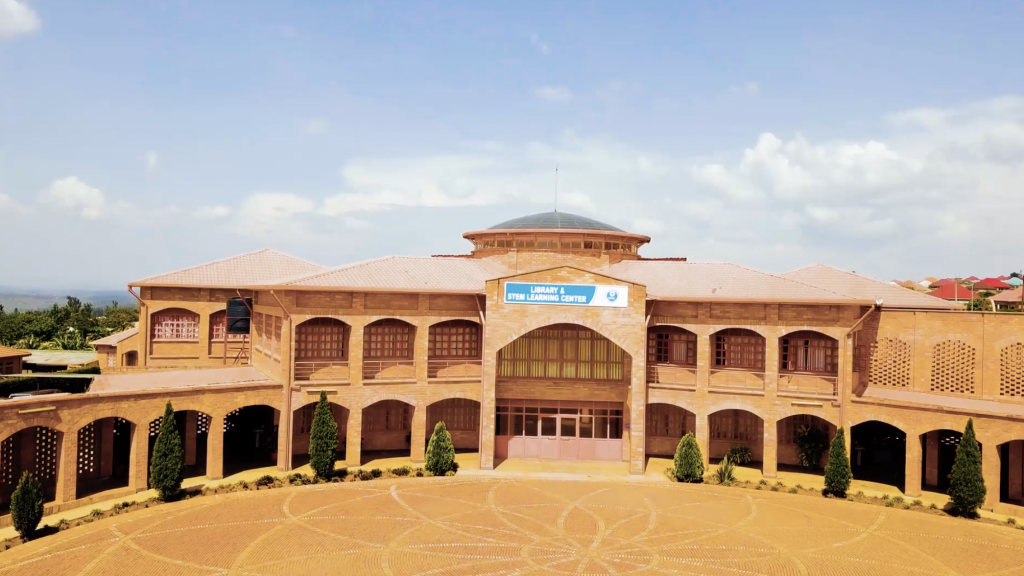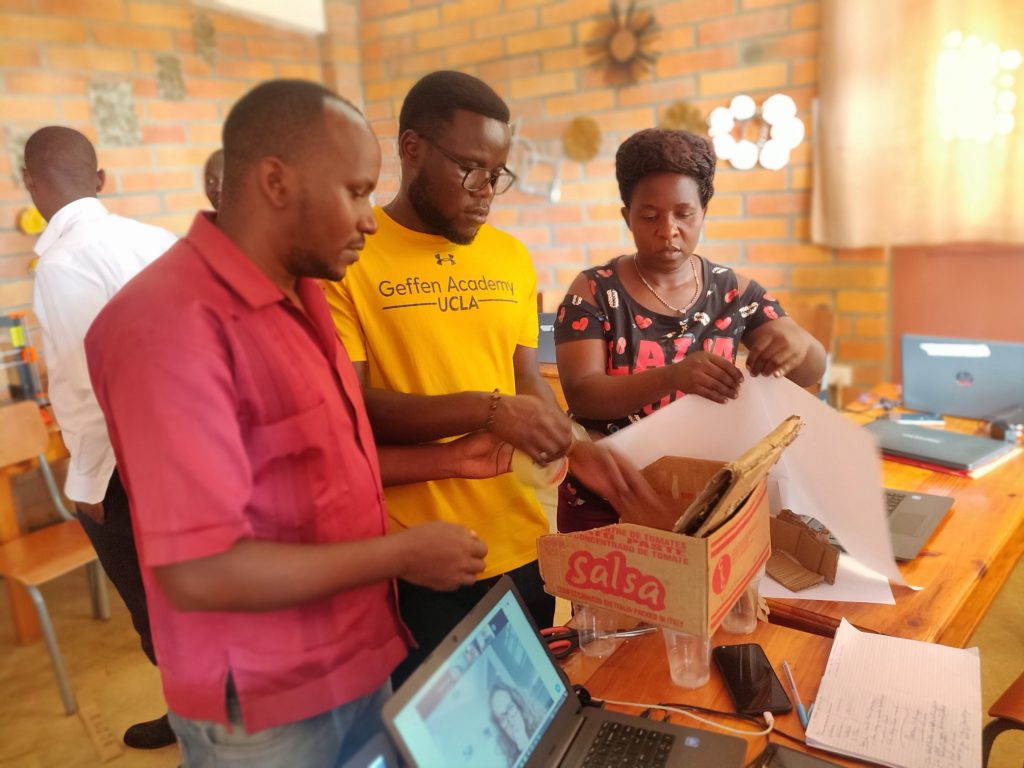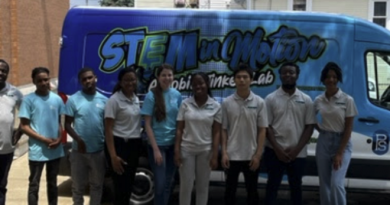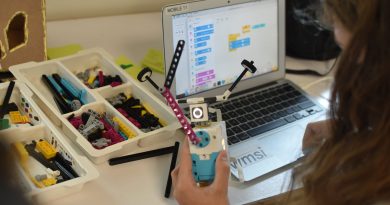Top STEM School for Girls Sparks 20 New Student Makerspaces in Rwanda
Collaborating organizations–Maranyundo Initiative, Maranyundo Girls School, and Tufts University–with a grant from the LEGO Foundation, provide support.
Students at 20 schools in Rwanda will soon have makerspaces in which to tinker, build, and invent. This is thanks to the efforts of three collaborating organizations: Cambridge-based non-profit the Maranyundo Initiative; the Maranyundo Girls School (MGS) in Rwanda; and Tufts University’s Center for Engineering Education and Outreach (CEEO). Dubbed “the Rwanda Makerspace Consortium pilot,” the organizations will provide the selected schools with the learning materials and teacher training on how to set up and run makerspaces that engage students in hands-on creative problem-solving through “making.” Funding is being provided by a grant from the LEGO Foundation.

Located just south of Kigali, in Nyamata, the capital of Bugesera district in Rwanda, the Maranyundo Girls School (MGS) is one of Rwanda’s top-performing STEM (science, technology, engineering, and math) high schools, offering access to excellent education to high performing students regardless of ability to pay. The Maranyundo Initiative built the school and has supported it since its opening in 2008 through scholarships, student and faculty programming, educational resources, and infrastructure. In 2019, the organization helped to establish a makerspace at the school.
In December 2020, Rwanda’s Minister of Information and Communications Technology and Innovation (MINICT), the Honorable Paula Ingabire, toured the MGS campus and visited the MGS Makerspace. She was inspired by the student “tech-makers” and their projects, and encouraged MGS to extend maker-thinking into the classroom, share its makerspace experiences with other schools, and strengthen linkages with communities throughout Rwanda. The Rwanda Makerspace Consortium pilot builds off the success at MGS and extends the makerspace experience to 20 additional public and private schools, creating a learning community of 400 makerspace-trained teachers, and bringing open-ended creative student projects to the classroom.
Professional development is underway, and participating schools have begun receiving the equipment and learning materials needed to run their makerspaces, including laptop computers; art supplies and basic building materials and tools; cameras; and other electronics, such as sensors, circuits, and robotics kits.

In April 2022, a cohort of 10 teachers participated in a week-long, remote Novel Engineering training with Tufts CEEO. Novel Engineering asks students to design solutions to problems raised in the stories they read in the classroom. By planning, refining, and testing their solutions, students learn and apply important STEM skills while strengthening their reading of these texts.
The Makerspace project hired Djamila Mathu Khamisi, an ICT expert, mentor, and coach, based in Kigali, to continue this professional development work with teachers in Rwanda. Khamisi completed a three-week training program at Tufts University in October. Afterward, she trained a group of 40 educators onsite at MGS, two from each of the 20 selected schools. Each of those educators will train an additional 10 teachers, thereby preparing more than 400 educators with the know-how to design and run makerspaces and makerspace clubs at their schools, where students meet regularly.
It’s been my dream to work with young people to bring about positive change in their communities using technology. Makers at Maranyundo Girls School are doing just that.
Djamila Mathu Khamisi, PEBL Fellow
Student-designed projects include moisture sensors that detect water levels in soil to improve irrigation and a sensor-operated fan that controls and measures room temperature. Since 2021, MGS Makerspace club members have hosted students from neighboring schools to share MGS projects and exchange experiences and ideas. Likewise, MGS club members will visit the newly created makerspaces at those schools this spring.
Education in Rwanda is central to Rwanda’s national vision which includes building a citizenry that will innovate, start businesses, and contribute to a thriving economy. Makerspaces put students at the center of their learning and give them the tools, materials, and space to be creative problem-solvers, according to Sister Marie Juvenal, who leads curriculum development for a network of 17 schools, including MGS, run by the Benebikira Congregation.
We know that students learn more deeply when they play an active role in their learning and are engaged hands-on with a project that is meaningful to them.
Sister Marie Juvenal, Maranyundo Girls School
Communication, collaboration, and critical thinking are also skills students develop when working in a makerspace community–skills that are essential for succeeding in the 21st century innovation economy.
“We’re excited to be able to work with schools across Rwanda on this initiative that was envisioned and encouraged by Rwanda’s Ministry of Information Communication Technology and Innovation (MINICT)” said Sister Marie Juvenal. She hopes the experiences will lead to a broader national makerspace rollout one day.
About Maranyundo Initiative
The Maranyundo Initiative began as a group of Rwandan and American women invited by the Government of Rwanda to start a middle school for girls in Rwanda. As a result of their initiative, the Maranyundo Girls School opened in 2008. Today, the school includes a STEM-focused high school and is one of Rwanda’s top-performing schools. The school enrolls about 400 girls in grades 7 through 12 from across Rwanda. Today, the Maranyundo Initiative supports the school with scholarships, college and career counseling, professional development, curriculum programming, and campus infrastructure, and extends selected programming and support to 27 additional schools. www.maranyundo.org
About the LEGO FoundationThe LEGO Foundation aims to inspire and develop the builders of tomorrow – a mission that it shares with the LEGO Group. The LEGO Foundation is dedicated to building a future where learning through play empowers children to become creative, engaged, lifelong learners. Its work is about redefining play and reimagining learning. In collaboration with thought leaders, influencers, educators and parents, the LEGO Foundation aims to equip, inspire and activate champions for play. www.learningthroughplay.com



